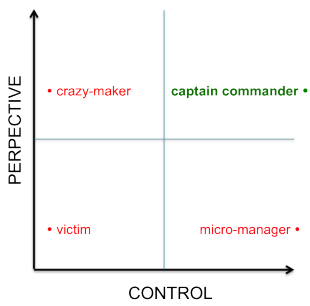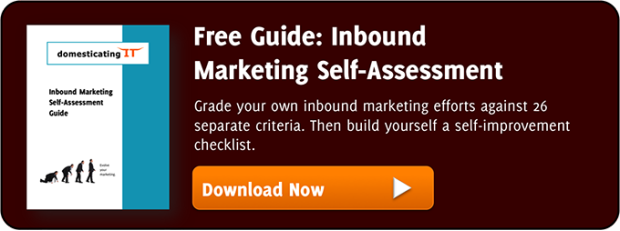A couple of weeks ago, I asked the question, “Are you too busy to blog?” In that post, I made the case that the reality is that you’re probably not too busy. Over the past couple of weeks, I’ve spoken with a bunch of prospects who say they’re too busy for all of this blogging and social media stuff. Since I can’t really come right out and tell them they probably aren’t too busy, I have to take a different approach.
The approach is based on David Allen’s life-altering personal productivity system called Getting Things Done (a.k.a. GTD). I watched a recent TEDx presentation by David Allen and two things occurred to me:
- It’s time to get back into my GTD habit
- The reasons people are unproductive are the same reasons they think they’re too busy for inbound marketing
Inbound Marketing Like Water
I bought his book Getting Things Done: The Art of Stress-Free Productivity (Amazon affiliate link) several years ago. Implementing and following his system is a lot like exercising: When you’re doing it regularly, you feel fantastic and your life is healthier and more productive. But, being human and all, it’s easy to fall out the habit and return to your old ways. The bottom line, however, is that when I’m using GTD my work is much more focused, productive and – perhaps most importantly – stress-free.
[nonmember]The Inbound Marketing Inquirer is a weekly premium article that’s free to view for members. Create a free account now:
[register_inquirers (free)][/nonmember]
[ismember]
Allen’s TEDx video (embedded below) summarizes the first chapter in his book, which lays the foundation for his system by explaining why our brains are terrible task management tools. He suggests that the reason is that our brains are pretty dumb at task management because they always remind us about something that needs to be done at the wrong time! For example, when do always remember that your flashlight needs new batteries? When you take it out of the drawer to use it and the batteries are dead, right?
When we store stuff in our heads, every single unfinished task is given equal weight all of the time regardless of whether or not we can do anything about it. We lay in bed at night thinking about all the stuff we can’t do at that time. Does that make any sense? This gives rise to the fundamental problem with our own personal productivity:
If you do not pay attention to what has your attention you will give it more attention than it deserves.
But flip side of that is also true. While you’re giving some stuff more attention than it deserves, it necessarily means that you’re giving other stuff less attention than it deserves. See where I’m going with this? The solution, Allen says, is to have a “mind like water.”
In karate there is an image that’s used to define the position of perfect readiness: “mind like water.” Imagine throwing a pebble into a still pond. How does the water respond? The answer is, totally appropriately to the force and mass of the input; then it returns to calm. It doesn’t overreact or under-react.
Perspective and Control
The trick to accomplishing inbound marketing like water is to balance perspective and control. Take a look at the following chart:

“Inbound marketing like water” requires a perfect balance of perspective and control.
When you have no perspective and no control, you’re a victim. In inbound marketing terms, it might mean you’re implementing a failing social media initiative foisted on you by a clueless executive team. When you have no control high perspective, you’re running around putting out fires constantly with no capacity to prevent the fires. In inbound marketing terms, this might happen when your website is getting great traffic but you don’t have the proper infrastructure (lead nurturing, analytics, email marketing, etc.). When you have total control and no perspective, you’re a micro-manager. In inbound marketing terms, you’re down in the weeds looking at metrics that don’t move the needle or contribute to the business.
And so the trick is to have the proper control and perspective. “Control” means having a proper inbound marketing strategy and the right tools and infrastructure to implement your plan effectively and efficiently. “Perspective” means putting the right amount of focus on the right thing at the right time. While everyone seems to be concerned about the former, I want to talk a little bit about the latter.
When I think about having the right perspective about inbound marketing, I immediately think about business objectives. What does your business need to do in order to be successful? Do you need more customers? More media coverage? More brand recognition? More revenue per transaction? Lower cost per customer acquisition? That’s the place to start.
Next, take a look at how your marketing resources are allocated. Are you spending time and money getting that direct mail campaign response rate to go from 0.2% to 0.22%? Are you going to Chamber of Commerce events? Publishing print advertisements? The question is not whether or not you have the time, it’s whether or not the time you have is being spent in the right place.
I recently went through the following exercise with a prospect. First, we took a look at how many customers per month they were servicing. It was around 120. Next, we did some quick and dirty calculations about lead generation and figured that an increased focus on web marketing could reasonably net an additional 10 customers per month. That’s an 8% increase in business. Finally, we figured that there 4 people in the office who should be able to contribute an hour per week.
So, the question becomes: Do you think that it’s possible that one out of those 40 or 50 hours per week could be reallocated to something else? Do think it’s possible that doing so would be worth an 8% revenue increase?
“Anything that causes you to overreact or under-react can control you, and often does.”
[/ismember]
Top Marketing Stories of the Week
5 Intellectual Property Laws about the Internet Bloggers Need to Know
Intellectual property law protects much of the content that you enjoy on the internet. Since many intellectual property laws haven’t yet been adapted specifically for the Internet, here’s a rundown of the basics you can use to safely guide your decisions.
The Shelf Life of Your Facebook Posts Is Shorter Than You Thought
Do you know the shelf life of your Facebook posts? It might just be shorter than you think.
Understanding Google’s Latest Assault On Unnatural Links
Google recently updated their Link Schemes/Unnatural Links document inside the Webmaster Tools section of their site last month. This article tries to define what is and isn’t acceptable at the tactical level.

